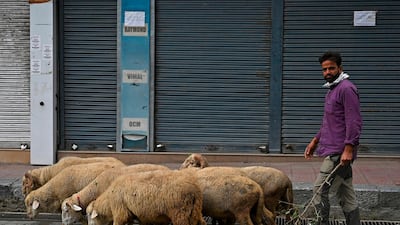Indian-administered Kashmir on Wednesday imposed a strict lockdown for a week as health authorities warned of rising coronavirus cases, a day after cancelling a major annual Hindu pilgrimage.
India, which has recorded almost 1.2 million infections – the world's third-highest total of cases – significantly eased a months-long shutdown in a bid to revive its shattered economy.
But several states across the nation of 1.3 billion people have reimposed strict restrictions in recent weeks as case numbers surged, sparking fears of overwhelmed healthcare systems.
Officials in Kashmir said the Muslim-majority Himalayan valley, apart from one district, would go into lockdown until July 29 when the restrictions would be reviewed.
The local government said there would be a complete lockdown in all red districts from Wednesday evening.
Agriculture, construction and transport of fuel and other goods was permitted under the order.
A similar declaration by the small north-eastern state of Manipur was made hours later, with the shutdown in place from Thursday afternoon for a week, with a possible extension to 14 days.
On Tuesday, the Amarnath Yatra, an annual Hindu pilgrimage to a cave shrine in Kashmir that draws about 300,000 devotees, was cancelled for the first time in more than a century.
The pilgrimage, held for almost two months, is usually guarded by about 40,000 government troops and health professionals.
But authorities said they were not able to divert such huge resources to the event during the health crisis.
"The health concerns are so serious that the strain on the health system, along with the diversion in resources to the yatra, will be immense," officials said late on Tuesday.
"This would also unnecessarily put the yatris at risk of catching Covid-19."
Kashmir, home to about 14 million people, has so far reported nearly 16,000 cases and 273 deaths, local health officials said on Wednesday.
Manipur, with a population of 2.8 million people, has recorded 2,015 infections but no loss of life.
The Kashmir lockdown came before Eid Al Adha, which begins at the end of the month and lasts several days.
Around the same period last year, the Hindu nationalist government of Narendra Modi moved to strip Kashmir of its autonomy and August 5 marks the first anniversary of the highly controversial decision.
Last year's pilgrimage was cut short days before the autonomy decision, with authorities claiming pilgrims and tourists faced terrorist threats from anti-India rebel groups.
Severe restrictions on movement and communications were also imposed across the restive region.
Kashmir has waged a three-decade armed rebellion against Indian rule, with tens of thousands of lives, mostly civilians, lost in the conflict.
_______________















